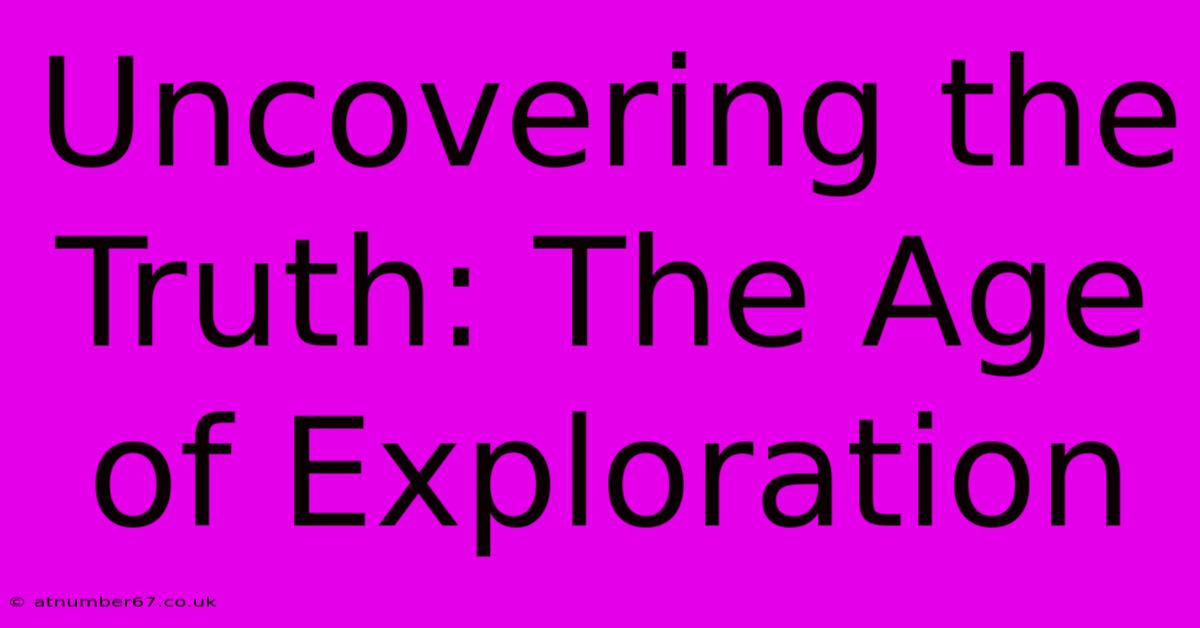Uncovering The Truth: The Age Of Exploration

Table of Contents
Uncovering the Truth: The Age of Exploration
The Age of Exploration, a period spanning roughly from the 15th to the 17th centuries, remains a captivating chapter in human history. Often romanticized, it's crucial to uncover the truth behind the glittering tales of discovery, acknowledging both the advancements and the devastating consequences of this transformative era. This exploration delves into the multifaceted realities of this period, examining its motivations, impact, and lasting legacy.
The Driving Forces Behind Exploration
Several factors fueled the intense drive for exploration during this period. Economic incentives were paramount. European nations, particularly Portugal and Spain, sought new trade routes to the East Indies, bypassing the established, and often expensive, land routes controlled by the Ottoman Empire. The promise of spices, silks, and other lucrative goods spurred ambitious voyages across uncharted waters.
Beyond Economics: Glory and Religion
Beyond economic gain, national glory and religious zeal also played significant roles. The competition between European powers to expand their empires and spread Christianity fueled a spirit of adventure and discovery. Patronage from monarchs provided crucial funding and support, transforming individual expeditions into national endeavors. The desire to spread Christianity – through conversion or, regrettably, often through forceful means – was a powerful motivating factor for many explorers and their patrons.
The Impact of Exploration: A Double-Edged Sword
The Age of Exploration dramatically reshaped the world map and global power dynamics. The “discovery” of the Americas, for example, led to the Columbian Exchange, a vast biological transfer of plants, animals, and diseases between the Old and New Worlds. While this exchange enriched diets and agricultural practices in both hemispheres, it also resulted in devastating epidemics that decimated indigenous populations.
The Dark Side of Discovery: Exploitation and Colonization
The consequences of exploration were far from universally beneficial. The establishment of European colonial empires brought exploitation, enslavement, and the destruction of indigenous cultures. The transatlantic slave trade, a horrific institution fueled by the demand for labor in the Americas, represents a dark stain on this period. Millions of Africans were forcibly transported across the Atlantic, enduring unspeakable suffering and contributing to the immense wealth of European powers. This brutal system had long-lasting, profoundly negative social and economic impacts on both Africa and the Americas.
Re-evaluating Narratives: A More Nuanced Understanding
For centuries, the Age of Exploration was portrayed primarily through the lens of European accomplishments. However, recent scholarship has worked to present a more nuanced and inclusive narrative, recognizing the perspectives and experiences of indigenous populations and enslaved peoples. This requires a critical examination of traditional accounts, acknowledging the biases and omissions inherent in many historical narratives.
Shifting Perspectives: Indigenous Voices and Resistance
By incorporating indigenous voices and perspectives, we gain a far richer understanding of the period. Their resistance to colonization, their sophisticated societies, and their struggles against oppression must be recognized as integral to the story. Examining the impacts of colonization on indigenous communities – from disease and displacement to the destruction of their cultural heritage – provides a much more complete picture of this pivotal era.
Conclusion: A Legacy of Complexity
The Age of Exploration was a period of profound change, marked by both extraordinary achievements and horrific atrocities. By acknowledging the complexities and contradictions of this era, including its devastating impact on indigenous populations and the horrors of the slave trade, we can develop a more truthful and responsible understanding of its legacy. This necessitates moving beyond simplistic narratives of heroic explorers and embracing a more multifaceted and inclusive interpretation of this transformative period in world history. The ongoing task of historical research and interpretation ensures a continuous re-evaluation, aiming to reach a more accurate and complete account of this significant chapter in human history.

Thank you for visiting our website wich cover about Uncovering The Truth: The Age Of Exploration. We hope the information provided has been useful to you. Feel free to contact us if you have any questions or need further assistance. See you next time and dont miss to bookmark.
Featured Posts
-
Jeffrey Cheah Sons Philanthropic Philosophy
Apr 02, 2025
-
Haris Raufs Son A Ray Of Sunshine
Apr 02, 2025
-
Kl Rahul Breaking The Stereotypes About Age
Apr 02, 2025
-
Mom Salary Comparison Expert Advice For Moms
Apr 02, 2025
-
Jim Balsillie Net Worth And Philanthropy
Apr 02, 2025
